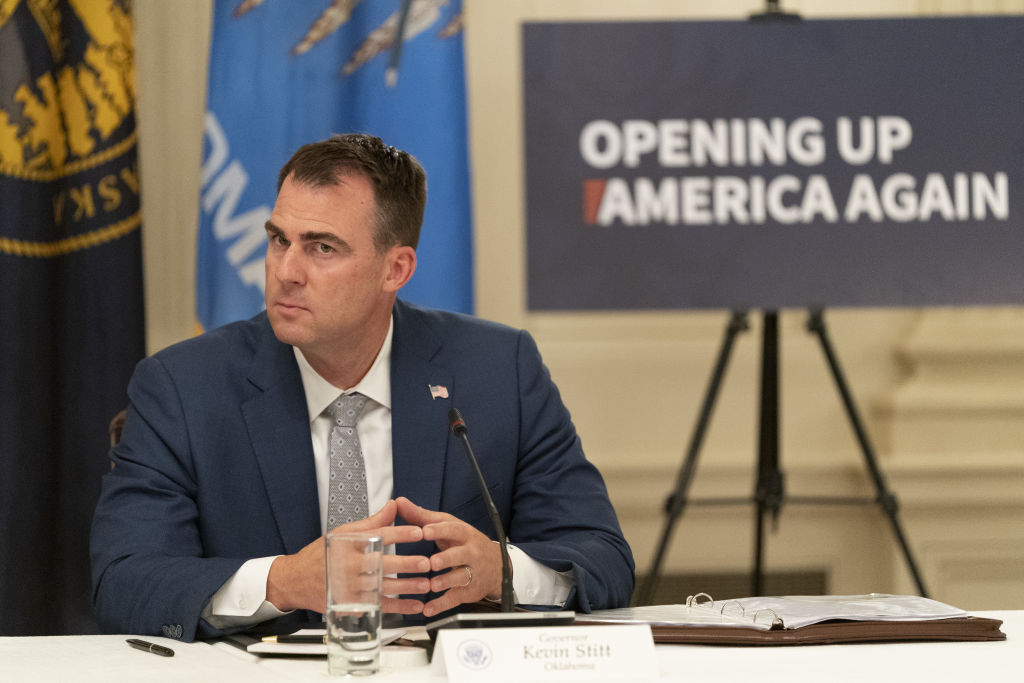Critical Race Theory: New Oklahoma Law Prevents Teaching Historical Facts
Oklahoma Governor Puts Feelings Over Facts By Signing Anti-Critical Race Theory Law

Source: Bloomberg / Getty
Republicans are more focused on not feeling bad about being racist than just not being racist. Claims that discussions about racism, sexism and other forms of oppression are divisive or make people feel bad have nothing to do with education.
Following this national trend, Oklahoma Gov. Kevin Stitt signed a new law that prioritizes feelings over progress. House Bill 1775 relies on a distorted framing of Critical Race Theory to prevent “mandatory gender or sexual diversity training or counseling” in higher education institutions. The bill also prohibits teaching on race or sex as inherently superior traits.
In a statement supporting HB 1775, Stitt said that students shouldn’t be taught that they are oppressors. He also claimed the law does not prevent teaching about Black Wall Street and the Tulsa Race Massacre, the Trail of Tears, or other important moments in history.
But critical race theory doesn’t teach children they are oppressors or evil for being of a certain race or sex. Critical Race Theory is merely a framework for analyzing ongoing systems of oppression. Sanitized versions of history leave out experiences that directly impact the current condition of many communities.
“HB 1775 at its core, it’s just a flagrant attempt to limit conversations about race and accurate history, and mostly because it makes Americans that look like me – white – feel uncomfortable,” Oklahoma City Public Schools Chair Paula Lewis told a local ABC affiliate.
In many ways, the crusade against Critical Race Theory extends the Lost Cause ideology, a mindset that paints the Confederacy as a noble endeavor. Similar revisionist thinking fuels the current wave of legislative attacks on diversity in education.
The obsession with preventing Critical Race Theory, and similar frameworks, from entering educational discussions coincide with efforts to minimize or distort the impact of racism on Black and other people of color.
Besides, there’s also no evidence that Critical Race Theory is taught in Oklahoma public schools. Black clergy urged the governor to veto the bill, saying it moved the state further from progress and reconciliation.
“The bill contradicts Stitt’s values of being an inclusive state,” read a statement from the Black clergy leaders. “It displays Oklahoma as an intolerant state that rejects diversity and promotes censorship. It prohibits the much-needed discussions about race and racism and how we as a state can learn and heal from the past.”
The passage of this bill comes at a crucial moment in Oklahoma History as the centennial of the Tulsa Race Massacre approaches. Members of the Tulsa Race Massacre Centennial Commission called the bill “a stain on Oklahoma.” The commission was set to determine whether the governor would be removed from the centennial body.
“No matter how poorly written, the intention of the bill clearly aims to limit teaching the racial implications of America’s history,” read the commission’s statement. “The bill serves no purpose than to fuel the racism and denial that afflicts our communities and our nation.”
An editorial from the Black Wall Street Times called for the governor’s removal from the Centennial Commission. The editorial mentions the bill reopened wounds for Tulsa’s Black community.
This is not the first time the Tulsa Race Massacre Centennial Commission clashed with a Republican leader in the state. The Centennial Commission asked Sen. James Lankford to step down from the commission after his initial questioning of the validity of the 2020 election.
SEE ALSO:
Critical Race Truth: Republicans Keep Trying To Revise America’s Racist History
Louisiana Republican Encourages Teaching ‘The Good’ Of Slavery, Not Critical Race Theory
















